Listen to our latest episode in the player here, on Apple Podcasts, Spotify, YouTube, or wherever you get your podcasts.
This Week on The Uplifters
“I was an educator for over eight years, and it didn't take a long time for me to realize the lack of access that children had to books. The kids were allowed to check books out of the library, but they were not even allowed to bring them home. I found myself buying a lot of books for my students.
I came home to my husband, and said, “Hey, you have always worked in custom apparel. I'm doing this education thing. There's a real need for more books. So I wanna create clothing that centers messages of inclusion, empathy, love, and kindness. And with every single purchase, I wanna put a book into the hands of a child. All I wanted to do was gain more access for my students. Never did I imagine that Kind Cotton would become what it has become today.”
Kind Cotton Founder, Kaitlin Johnstone
What Kind Cotton has become is a movement. They have donated 124,000 books so far, and they’re just getting started!
Kaitlin and her husband believe that kindness is the most basic human right, but it needs to be more than just simple pleasantries. In order to make a difference and change the world, kindness must be rooted in justice and action.
To celebrate Kaitlin’s great work, we are doing our first-ever raffle: A Kindness Chain.
Here’s how it works: Do something kind for someone, post about it on social media, and tag us (@theuplifterspodcast) to be entered to win a Kind Cotton shirt of your choice. We will announce a winner next Friday.
In this episode you’ll learn:
[00:07:00] How to put your ego aside and ask yourself what systems you might be upholding that are causing harm.
[00:18:00] How to protect your peace in the face of negativity on social media and in your community.
[00:26:00] Ways to be proactive about your mental health instead of reactive.
Kaitlin was nominated for the Uplifters by .
Learn more about Kaitlin at Kind Cotton.
Messy Transcript
Aransas: [00:00:00] Welcome to the Uplifters Podcast. I'm your host, Aransas Savas, and you just heard the wonderful Christina Testut from episode 16. Introducing today's guest, Kaitlin Johnstone. Kaitlin, I'm so excited to meet you.
Thank you for being here.
Kaitlin: Thank you so much for having me.
Aransas: Your mission is so beautiful and generous and important.
How did this become the thing that you put your energy and attention into?
Kaitlin: That's a great question. So I was an educator in the state of Florida for over eight years, and it didn't take a long time for me to realize the lack of access that children had to books. In fact, in the school that I was in at the time when I started my educational career, The kids were allowed to check books out of the library, but they were not even allowed to bring them home.
So I found myself buying a lot of books for my students. They were taking them home from our classroom library. Um, I was buying them for winter break and summer break, and, and anytime I had an opportunity to get my hands on books that [00:02:00] children could keep, I was making that happen. So I came home to my husband, who was not my husband at the time.
I don't think timeline is, you know. But I came home to him and I said, Hey, like you have always worked in custom apparel. I'm doing this education thing. I'm recognizing that there's a real need. For more books. So what I wanna do is create clothing that really centers messages of inclusion and empathy and love and kindness.
And with every single purchase, I wanna put a book into the hands of a child at the time. All I wanted to do was gain more access for my students. Never did I imagine that kind cotton would've become what it has become today. Um, in the very, very early days, I started reading program at that school that I was teaching at, and I would do a lesson once a month.
On a book that really [00:03:00] centered the idea of kindness. And then at the end of my lesson, every single child would get to leave with a copy of the book that I had done my lesson on. And there were about 30 students in the program at the time. So I used to tell myself every single day when I woke up, if I can just sell one shirt today, then I can fund that reading program.
And now we're up to over a hundred thousand books, which is like, I have to remind myself of that almost on a daily basis, um, because it's pretty amazing.
Aransas: And why was it kindness that felt most important to center here?
Kaitlin: That is an amazing question, and I've done quite a few podcasts and I don't know that anyone has ever asked me that question, and that's so important.
Um, I grew up in. A dance company that was not your [00:04:00] traditional company. It wasn't like doing shows and stuff. We were a very beautifully diverse group of children. Um, all different backgrounds, all different religions, all different races. And our teacher really. Centered this mission of kindness that was different than your average way of looking at kindness.
It wasn't just niceness, it was, it was seeing one another's differences and honoring those differences and not othering them. And that has been something that has always stood by my side, whether it be through our business or just my personal life. And I really wanted to, Have children see themselves in the books that we donated.
So I knew that the clothing had to represent that exact [00:05:00] messaging.
Aransas: And when you talk about the clothing, what are some examples of, of what these shirts say?
Kaitlin: Yeah, so our most popular design is one that kind of takes on a definition of kindness. We actually created it with all of our customers and our followers.
I was like, listen, this is the sole mission of kind. Cotton is kindness, but what does kindness mean to you? And we had hundreds of entries and we asked them just for one word, like if you could center kindness, What would that one word be? And we picked our five favorites, which is love, empathy, inclusion, compassion and justice, which ultimately makes up kindness.
And that has become our bestselling shirt. I would say that 80% of our sales is that exact design. Um, that shirt alone has probably donated over 60,000 books. Uh, [00:06:00] And yeah, it's just, it's really special to me because it was a group effort and it was a, a collective that really came together in wanting to center some goodness in our world that's so
Aransas: meaningful and I think so heartening to know that there are so many people out in the world who want to center kindness.
Mm-hmm. So who are these people?
Kaitlin: So I love to think of those people as the helpers, the people who are out there wanting to. Cultivate change in a way that our society really needs some change. Right now it's the people who are, who are open to hearing that change. It's the people who can kind of [00:07:00] put their ego aside and recognize that, hey, like sometimes I uphold systems that are causing harm, and what can I do to be a part of the change as opposed to remaining.
A part of the problem, and I think that that's something that's really difficult for us who. Have varying levels of privilege to understand, like that's become such a buzz word for like, Ooh, my guard is up and I don't wanna talk about this. And, that's just creating divisiveness when in fact it's just really trying to unify people and really try and bring apart.
Bring together the fact that we do have a lot of things that we need to work on, and the only way that we're going to create a more kind society is if we recognize [00:08:00] those things and then we fight to do better.
Aransas: If you were to imagine the kindest vision of our future as a country, what might it look like?
Mm-hmm.
Kaitlin: It would look. Like the words on this team, it would look like justice and inclusion for all. Like truly inclusion for all. It would look like equity for all. It would look like access for all. It would look like kind of tearing down these systems that have only benefited certain people for centuries and rebuilding them with.
Community in mind.
Aransas: Mm-hmm. Yeah. And a, and a genuine belief that it is better
Kaitlin: for all. When we want equity, we're not taking the entire pie, right? We're just like dividing it in equal parts so that everyone is seen and heard and valued for exactly who they are.
And the reality of our country is, is that marginalized communities are marginalized communities for a reason and they don't have an equitable. Seat at the table. Yeah.
Aransas: At the moment. Well, and I think whatever it is people really value, whether it's innovation or wealth or power mm-hmm. All of that actually is compromised by an equity.
Mm-hmm. Because the greatest potential can get lost in that system and can get hidden and. That alongside just the, the power of diverse thinking and the innovation that yields it truly is [00:10:00] better for everyone. And yet it's scary, right? Because I think, like you're saying, there is this fear that if I give up my piece of the pie, am I gonna go hungry?
Kaitlin: Mm-hmm. Yeah. No, I totally understand where you're coming from and I think that's what's what. Drives a lot of people to hold so tightly to these systems is that it's when we're, when we're leading our actions through fear, we're not, we're not doing anyone the best service that we can be doing.
Mm-hmm.
So you, so you started this project in Florida,What was the response to starting this project?
In this time, in that place
Kaitlin: we started kind Cotton going on six years ago now. So at the time, I mean, I can remember the first time that I. Just posted something that said Black Lives Matter. And this is why, you know, it's important to represent all children in literature because the reality of it is, is that, uh, black characters only make up like 9% of children's books, and we have many more black people in America.
And this is so important and people loved it. I mean, if I got one negative comment [00:12:00] that was like, A lot in the, in the thousands of, of comments and likes and, and feedback that we received. Because that was a different time, right? Like people were, not to say that there weren't people who were like, oh no, this is absolutely terrible.
And obviously I had cultivated a business and a brand in which certain people were viewing. Yep. My things. But I will say that at the time I was an educator who taught accurate history, who read books that featured. All family dynamics. You know, one of my favorites of all time that I would always read was the family book by Todd Parr, which is one that has been banned in states such as Florida.
That simply says, some families have a mom and a dad. Some families have two moms. Some families have two dads. Some [00:13:00] families have one parent, some children are adopted, and I never received any negative feedback ever. In my eight years of teaching, so fast forward to when I left the classroom, which was a couple of months into the pandemic.
I just had my daughter. My parents were both very high risk and I made the choice that if I was ever going to do kind cotton full-time, now is the time. So I still had a lot of connections within the district that I was teaching in and a lot of support in that district. And we had run fundraisers with various schools in that district, and we set up a fundraiser with a local elementary school, and some people got a hold of our website and started [00:14:00] threatening us and started calling us.
Incredibly horrific profane things, uh, could easily find out where we lived. Were showing up on the doorsteps of other people in the community who were speaking up for equity and inclusion, and I can remember that was the day that I went into my husband's office. Hysterical. Saying we have a daughter to think about and it comes with immense privilege to be able to pick up and leave.
Um, but we left our home and we moved to a place in which we felt more safe. Um, and that is just like the very surface level explanation as to what happened because I haven't really felt. Fully comfortable coming out with all of the details. So for anyone who may hear this, who thinks that it's all just like a conflated message and book bans aren't really happening and these horrific things aren't taking place, they really are.
Aransas: What a terrifying and heartbreaking experience. Yeah. You know, just on this very human level, it breaks my heart that people would want to hurt people because they want kindness and acceptance for all people.
Yeah,
Kaitlin: yeah, yeah. What a tragedy. And instead of kind of saying, this is unacceptable, like we're gonna go through with this, because the [00:16:00] important message here is that children are getting access to books. The school district backed down as they do when there's a lot of loud noise from a very small minority.
And I always caution people about, Saying, well, this is just the vocal minority. Like these things aren't really gonna happen because in many instances the vocal minority has been so loud that like these things really are happening, you know? And that's sad. Yeah,
Aransas: it's very sad and it's very real. Andyou were.
Aiming, I think, to do all of this from a root of kindness. So there are many different ways to create change and, and I think one of the things I take from your approach is that you feel most authentically aligned with an approach that is unifying, um [00:17:00] mm-hmm. And not an approach that is divisive. And.
So to face that sort of division and unkindness in response to a message of kindness, I feel like just had to be really disorienting.
Kaitlin: I'm used to it on social media, like I've gotten to a point where it used to give me like full blown anxiety and it was really difficult for me to just see some of the messages that I would receive online.
But I've now gotten to a point where I understand that if someone is coming at you with such hate that you're not ever gonna change that person's mind. So, There is beauty in blocking and deleting and protecting your piece, but when I faced it head [00:18:00] on, like in my life, in my community, it was really hard.
And I think that's why it's so important to continue advocating for inclusive education. It's important to continue advocating for being against book bans. It's important to. Advocate for all children to be seen in the books that they read. And that's kind of what keeps us going in knowing that if we can just reach one child who needed that book, just to say, Hey, like that's like me.
And for the first time ever, I don't feel different than all of that other stuff is worth it.
Aransas: What is it about books? Why are they so important to kids to have equal access to?
Kaitlin: [00:19:00] So I can remember just all of these beautiful memories around books I can remember. My mom curling up with me and taking me on adventures that maybe I would've never known in my real life, but a book could take me there.
So I think that in and of itself is very, very, very important. There's also the ed educational aspect of it, whereas children who have more books in their home are. Proven to just do better academically. That's really important. And then there's this, there's also this piece of representation and how important that is because every single child deserves to be.
The hero in the story, the prince, the princess, and every other child should have the opportunity to see children who are different from them to [00:20:00] to learn about various cultures, to understand family traditions that may not be similar to their own, because that is the only way in which we can truly develop empathy for one another.
You may not know a ton of people who are different from you in your bubble of where you live, in your school community, in your family community, in your neighborhood, but books can really give you that opportunity to see someone else's life and to see that their differences are not scary, that their differences are not something to be afraid of, that their differences.
Are in fact different. But those differences make us who we are and it makes us see the beauty in our humanity.
Aransas: Yeah. Yeah. And it makes us see that our way is not the only way.
Kaitlin: Yeah, for sure.
Aransas: Absolutely. And especially [00:21:00] as children, we only know what's happening in our immediates runnings, our worlds. I mean, they're bigger, I guess now for children than they once were because of, uh, digital access, but mm-hmm.
For the most part, we know what our parents say is good to eat, and we know what our. How our parents tie their shoes, right? Like that these are, these are our people and our influences, and so we grow up believing that that's the only thing that exists is that little bubble. And I do think that books can really expand that perspective and help children choose what's right and true for them.
Yeah. Yeah, 100%. Which is maybe part of what makes it scary for people.
Kaitlin: Yeah. Yeah, for sure. So
Aransas: what's next for sure for you and kind Cotton, what big dreams do you have?
Kaitlin: Hmm. So we always say, and we've said this from the beginning, that we are on a road to 1 million books donated. And that used to feel like this huge, lavish dream that could never be accomplished.
But now that like, We're kind of seeing that that could be feasible is like really, really, really exciting. I just want children to have access to as many inclusive books as possible. I wanna continue our advocacy work. I want to really develop a community in which people feel connected and people feel like they're not kind of going through this.
Scary time alone. Um, because I think that that's something that I've needed along this journey. [00:25:00] And yeah, I, uh, I have a lot of, a lot of grand ideas and thankfully I have a partner in my husband who is my life partner and my business partner who is much better at taking those ideas and making them happen.
I'm kind of the dreamer and he's the doer. So, um, we'll see what's in store. Good balance
Aransas: there. You found the right partner? Yeah, for sure. Mm-hmm. So you are decidedly an uplifter. You are someone who with your daily life, Has really put energy and focus into making your community and the world a better place for others.
But I think one of the biggest challenges for Uplifters is learning how to care for ourselves as well as we care for everyone else. So how do you care for yourself mentally?
Kaitlin: Oh my goodness. So I go to therapy, which I understand [00:26:00] that. There's a lot of issues with access to that, and that's like a whole nother podcast episode.
Mm-hmm. But if it is accessible to you, I highly recommend it. And one of the first things that my therapist ever said to me is, Caitlin, you need to show up for yourself the way that you show up for other people. Like that's, you know, end of story. And for some reason that was like a light bulb that went off for me because I've never really had anyone.
Put it in such simple terms. So for me, making sure that I have some quality time to just be with myself regardless of how busy I am and how stressful the day-to-day is, is really important. The way that that looks is always somewhat different. I, for my mental health, really need to move my body. I. Love writing.
Do I [00:27:00] always do it? Not so much. Um, reading has become huge for me and making sure that I love to read all different things, but making sure that I leave my heavy reading during the day and kind of like my lighthearted reading before bed and yeah, just, just doing. Check-ins on myself. And again, I am incredibly fortunate that I have a partner in which that is feasible and we both really hone in on and support one another's needs when it comes to like finding that that balance of parenting and, and business work and also really.
Making sure that we are mentally sound and well too. Yeah. What does that
Aransas: look like to partner with your husband and while also partnering with him to raise a child? How do you find that
Kaitlin: [00:28:00] balance? we are very alike in many ways, but then we're also like super different, like I mentioned before.
So kind cotton would not work. Without the two of us. Like I always say that I do all the social media and the podcast and, and talk to people and the book events and all kind of like the face-to-face things, but like if it were just me, we literally wouldn't even have a website. Like he is the man behind the scenes making it all work.
So I love that we balance each other in that way and we also very much balance each other. In life in that way. Um, pre having our daughter, so pre-children, I think that we were both just like very type b very laid back, very easygoing. And then you get smacked in the face with a [00:29:00] pandemic and an infant who was colicky and like all of these other things and you're like, Oh wow.
Like we really can't just survive off of, of like just being super chill. Um, so we have definitely like done some therapy together, and talked through the fact that parenting is hard and communicating through parenting is really hard and that has done. A tremendous amount of good for us, and that's another thing that I would recommend.
Like I look at mental health and relationships as being proactive as opposed to reactive. So, I went into therapy the moment the pandemic started being like, Hmm, I could see that. Like we're all gonna be struggling a bit here and I wanna be ahead of the game so that I feel the best about myself, that I can.
Similarly, [00:30:00] we were like, oh, we're having some challenges, just like with our daughters. Um, I don't wanna say behavior because you know, she just had like some stuff going on that a lot of infants do, and we wanted to make sure that our relationship was super sound and the way in which we wanted to parent was in line.
And there was a lot of unlearning that took place too, because our generation kind of parented in a completely different way. So just. Being on the same page and being able to communicate and being able to ask for help and kind of humble yourself in doing so has been huge for both of us.
Aransas: Hmm. What a beautiful investment in your relationship.
Well, Kaitlin, yeah, I know you have a world to get out there and change and, uh, it needs you. We need you. Thank you for all that you do. For all of you listening to the Uplifters podcast, I hope you'll check out Kind Cotton and Caitlin's work there. Um, Buy a shirt, donate a book. I'm gonna go over and do that as soon as we end this session, and then I hope you'll come over and hang out with us@theuplifterspodcast.com where you'll find lots of other uplifters and you'll get lots of other information about ways that you can be your best self and keep doing all of the great work that you do out in the world.
Let's keep rising higher together. Thank you so much. Thank you.






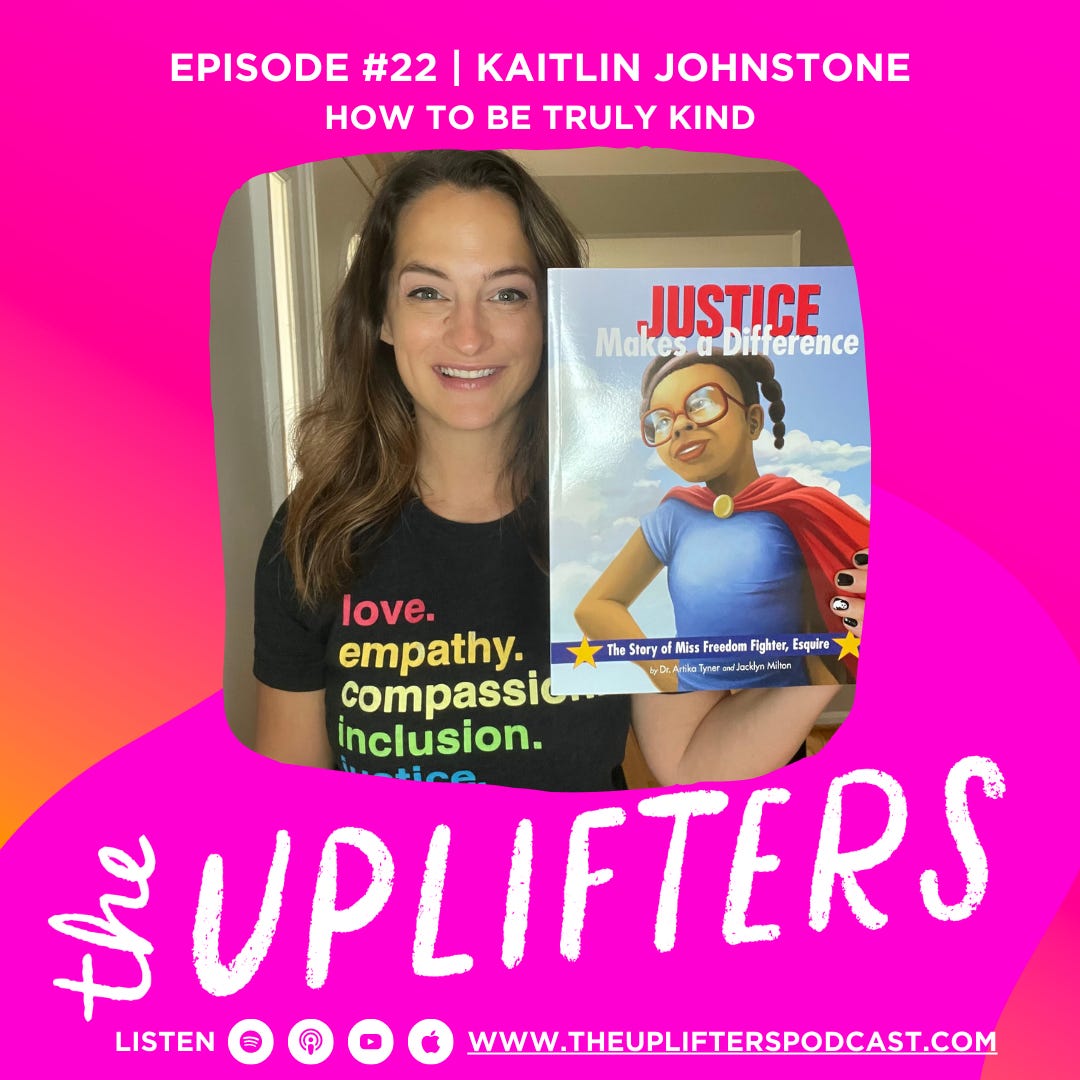


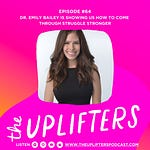
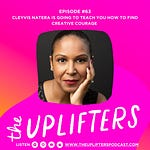

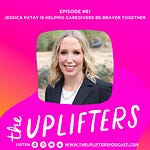
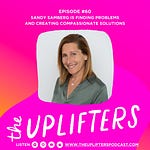

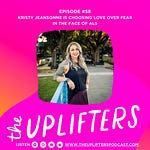
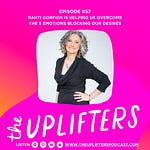
Share this post